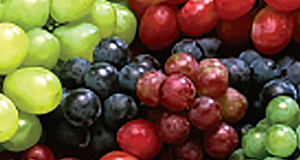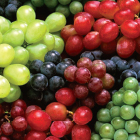

 The most common joint disease among Americans is osteoarthritis, a condition in which the natural cushioning between joints—the cartilage—wears away.
The most common joint disease among Americans is osteoarthritis, a condition in which the natural cushioning between joints—the cartilage—wears away.
Because symptom management is often ineffective and joint replacement is invasive surgery, many osteoarthritis suffers seek natural approaches.
Grapes are rich in anti-inflammatory polyphenols, compounds that have been shown to reduce inflammation. Shanil Juma, of Texas Woman’s University, and colleagues conducted a 16-week clinical study, in which 72 men and women with knee osteoarthritis were assigned to consume either grapes, in the form of whole-grape freeze-dried powder, or a placebo powder.
Both the men and the women who got the grape-enriched diet reported significantly less pain related to activity and an overall lessening of knee symptoms—notably, improved joint flexibility and overall mobility. This beneficial effect was more pronounced in females. Additionally, age-related differences were observed: There was a 70 percent increase in very hard activity for those under 64 who got the grape powder, while those receiving the placebo reported a significant drop in very hard activity.
Attributing the observed benefits to the polyphenols found in grapes, the lead investigator comments, “These findings provide promising data that links grape consumption to two very important outcomes for those living with knee osteoarthritis: reduced pain and improvements in joint flexibility.”
Juma, S., et al. (2014). Age-associated effect of freeze-dried grape powder on inflammatory markers and physical activity in adults with knee osteoarthritis. [Abstract 1025.8]. FASEB J. 28:1025-8.
—Dr. Bob Goldman
www.WorldHealth.net
Editor’s note: For the latest information and research on health and aging, subscribe to the American Academy of Anti-Aging Medicine e-zine free at WorldHealth.net.



















You must be logged in to post a comment Login